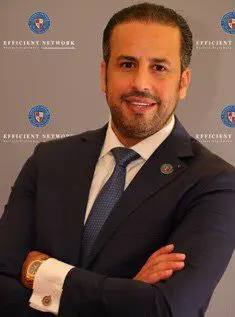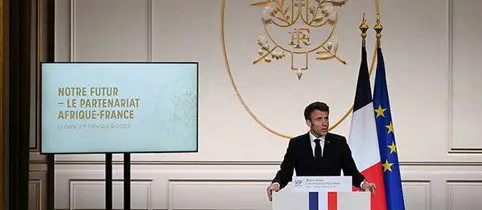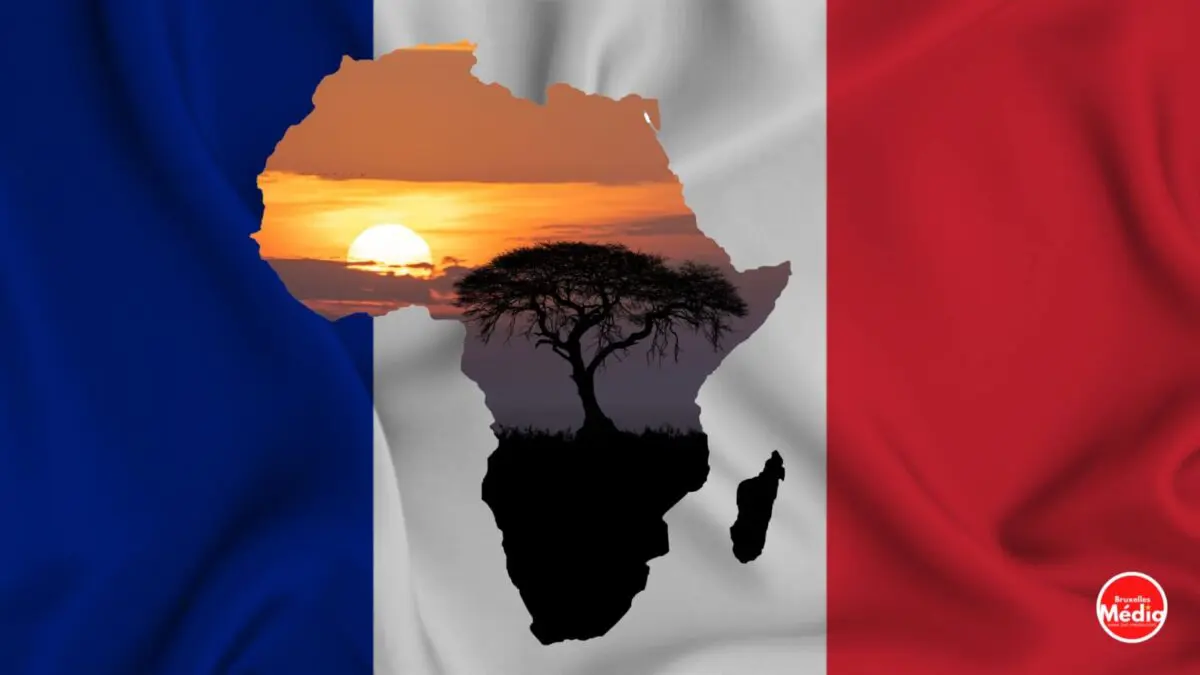
Exploring the relationship, between Africa and France Kamal Benali delves into this multifaceted connection. Drawing from his expertise in geopolitics he carefully examines the political, economic, and cultural aspects that have shaped this bilateral bond. With his experiences and extensive network of connections with leaders, he provides an insightful analysis of the challenges and possibilities that lie ahead for these two entities. In doing he offers a perspective, on how their engagement is evolving in a rapidly changing global landscape.
Article written by Kamal Benali
France’s future in Africa is currently being played against a backdrop of the fight against terrorism, the well-understood economic interests of the former colonial power, a resurgence of African nationalism, and foreign influences, notably Russia via its armed and economic arm on the continent, Wagner.
France’s legitimacy in the fight against the influence of radical Islamists and terrorists in the Sahel is unquestionable, even if it is also, and by the same token, a question of bolstering France’s economic and geopolitical interests, interests recently undermined in Niger following the coup d’état that toppled the duly elected President Mohammed Bazoum.
Some French-speaking African countries, such as Mali and Burkina Faso, believe, rightly or wrongly, that their sovereignty has been under French tutelage for too long and that the time has now come for them to fully assume their destiny, regardless of France’s wishes, i.e., its interests. While we may sometimes doubt the authenticity of this nationalism among the new leaders of these two countries, who are known to be ready to exchange one past tutelage for another (e.g., Russia), we do not question the reality of the emergence of a strong national feeling. It’s a mixture of pride in what they are and rejection of what France has represented for the active youth of these nations.
The diplomatic battle is intense today. On the one hand, several ECOWAS countries do not recognize Niger’s new leaders, while France is intervening in this thorny issue. On the other hand, the military regime now ruling Niger enjoys the support of a large part of the population. The latter, whether spontaneously or as a result of skillful manipulation, is exasperated by what it perceives as French domination.

Consequences of external intervention in West Africa
Are we witnessing a repetition of what has already happened in Mali and Burkina Faso, where leaders and populations seem to have agreed to end France’s influence, if not its presence, without anyone seriously doubting Wagner’s role in these operations? This position, in reality, has only one aim: to exploit the natural resources of these countries on behalf of Russia and certainly not to put them at the service of their development and populations.
France’s presence in West Africa, and specifically in Niger, is the subject of fierce contestation. France must adapt to this new African reality for economic and geopolitical reasons. This adaptation is crucial not only to counter Russian expansionism but also to safeguard its interests, not all of which are illegitimate.
The recent political history of West African countries has been a succession of setbacks for France.
Chronic poverty, substantial income inequalities between the ruling class and the population, and idle young people with no future, all too often forced by necessity to emigrate to Europe, make an already delicate situation even more difficult for security, political, and economic reasons. The stability of the West African states is thus compromised, with the vivid anti-French sentiment serving as a catalyst as much as a pretext for serial destabilization operations.
From intervention in Libya to the crisis in Mali
In 2013, Mali’s interim President Dioncounda Traoré called on France under President François Hollande to prevent Bamako from being taken over by heavily armed terrorist groups from Libya and northern Mali.
On January 11, 2013, François Hollande launched Operation Serval to push these terrorist groups away from Bamako, Mali’s capital. But this was no more than a tactical retreat for these groups since, entrenched in northern Mali, the terrorists had successfully formed a terrorist state in Kidal, i.e., establishing themselves on a territory.
In reality, the creation of these armed groups stems from the bombing of Libya orchestrated by NATO at the request of Great Britain and France, leading to the collapse of Mr. Gaddafi’s regime. This intervention, justified in the name of human rights by the West, lifted the barriers holding back sub-Saharan immigration. The human rights fallout could prove worse than the problems it was hoped to solve by eliminating the Libyan leader. What’s more, traffic in modern, sophisticated weapons has been organized. These weapons have been recovered by jihadists, including Al-Qaeda, the Islamic Al Maghreb (AQIM), and Arsadine, as well as by the Tuareg rebels of the Mouvement national pour la libération de l’Azawad (MNLA), who dominate northern Mali. The common aim of these movements is to destabilize the countries bordering Libya and, if possible, take control of them.
On August 18, 2020, Mali’s democratically elected President, Ibrahim Boubacar Keïta, was overthrown by a group of colonels led by Assimi Goïta. These soldiers were quick to criticize, with a particular bias, the lack of effectiveness of the French Barkhane force, which they deemed incapable of eradicating terrorism in northern Mali. This criticism prompted the regime to call for withdrawing French troops and MINUSMA a few months after coming to power. Despite more than ten years of operations, these forces were accused of being costly for Mali and ineffective against the terrorists and the areas they control.
After Mali, Burkina Faso, Guinea Conakry and now Niger, What about the decolonization pact?
Deteriorating economic conditions are often conducive to the emergence of undemocratic powers, whose actions always end badly for people who may have believed that authoritarian or even dictatorial regimes would be more effective than others who respect civil liberties. We witnessed this in Europe between the two Great Wars and Latin America throughout the last century. However, before projecting this pattern elsewhere, we must analyze the historical, political, and cultural conditions and traditions of the countries concerned, particularly in Africa.
Russia’s growing influence in Africa
It’s important to understand that the collective consciousness of African populations has evolved through observation of world events to which they have access, just like most other peoples.
Scrutinizing the horizon, reading the signs of the times, and understanding the economic stakes of today’s world are now within people’s grasp. However, this understanding needs to be improved on the one hand by manipulations of the popular masses orchestrated by a group of interests working for Russia. On the other hand, it is biased either by the naivety or personal interests of new leaders, often military. Some of them have seen fit, even wise, to enlist the help of the Wagner armed group to run their country.
It is not in the interests of the people or the continent to welcome a partner with dubious intentions to this region, which is already vulnerable for the above reasons. Economically, the aim is to despoil the countries concerned. Geopolitically, the purpose seems to destabilize the European continent, notably by encouraging mass immigration.
But it’s doubtful that Africa will benefit from such destabilization if Wagner’s plundering of countries is indeed likely.
Mali is a case in point. In the name of the indisputable principle that people everywhere are free to determine their destiny, the coup d’état of May 18, 2021, in Mali, saw Mr. Assimi Goita come to power as President of the Transition. Only a few months after taking office, he decided to call in the private Russian militia Wagner to reconquer the territories under jihadist control completely. We know that this reconquest has come to a standstill, that massacres have been carried out by the militia as mentioned above, whose modus operandi is well known, and that the country’s economy is gradually being handed over to the Wagner group and therefore to Russia.
What can France and its allies do about this situation? Strategically, their options are limited. They mainly denounce the Russian government’s involvement and association with the Wagner group. Jean-Yves Le Drian, former head of the Quai d’Orsay, has openly criticized this alliance. He stressed that France would never support policies that overly favor Russia, given that there is no valid justification for Russia’s presence in Africa other than its attempt to destabilize Europe through hybrid wars.
On the Mali-Burkina Faso front, France was at the forefront of clashes between terrorist groups and the national forces of both countries. Violent attacks on the Burkinabe national army and mining operations, the economic mainstay of Burkina Faso, led the population to express their displeasure with a French convoy, ultimately demanding the withdrawal of these troops. This situation opened a door of opportunity for Russia, eager to become more involved in this region with its far-reaching economic and geostrategic implications.
As a result, the constitution was suspended on January 24, 2022, and the government and national assembly dissolved, with the regime promising a “return to constitutional order” within “a reasonable timeframe.” These circumstances led to the fall of the government of President Roch Marc Kaboré, who has been in power since 2015. He was overthrown by Lieutenant-Colonel Paul-Henri Sandaogo Damiba, surrounded by other military personnel, who set up the “Mouvement Patriotique pour la Sauvegarde et la Restauration” (MPSR), currently in power.
The waltz continued eight months later, this time with the arrival on the scene of Captain Ibrahima Traoré, who put an end to the short-lived power of Lieutenant-Colonel Paul Henri Sandaogo Damiba, judged to be overcautious and too close to France due to his close relations with President Alassane drama OUATTARA of Côte d’Ivoire.
On this occasion, a vast and delighted crowd, mainly of young people claiming to be patriots, pan-African activists, and militants, attacked the French embassy. They also threatened French interests throughout the country. Their anger was palpable in the streets of Ouagadougou: they waved Russian flags and demanded the immediate withdrawal of some 400 French special forces soldiers stationed in Burkina Faso.
While France condemned these acts, Russia saw them as an opportunity. It quickly declared its willingness to support the new military regime in its fight against terrorism.
A more cautious approach towards the Niger regime would have been more profitable for France in the current volatile context of anti-French sentiment, to which we can add the incapacity, if not the incoherence, of ECOWAS countries undermined by hidden agendas against each other. This situation has only strengthened the regime’s position in power in Niamey despite the firm stance taken by French Foreign Minister Catherine Colonna.
But to no avail, the regime held firm, and Bazoum was still detained.
Challenging colonial ties and the rise of Russia
Since September 2022, against a diplomatic row between France and its former colony, Burkina Faso, Ouagadougou and Moscow have grown considerably closer. Faced with the skepticism of the international community, Burkina Faso’s Minister of Foreign Affairs, Olivia Rouamba, arrogantly reassured everyone that “Russia is a reliable partner.”
Several Burkinabe officials, including Prime Minister Apollinaire de Tambéla and the President of the Transitional Parliament, Dr Ousmane Bougouma, recently visited Moscow….
Indeed, according to the vindictive philosophy of these military regimes (Mali, Burkina, Guinea Conakry, and Niger), which came to power through a coup d’état, the revision of treaties and subsequent agreements has become a significant imperative and a fundamental question of national sovereignty.
The two putschist heads of state of Mali, Mr. Assimie GOITA and Burkina Faso’s Captain Traoré, have officially and definitively broken all cooperation agreements with the former colonial power. It was done during the Russia-Africa summit on July 22 and 23, 2023, in St. Petersburg, Russia. What a symbol!
On July 26, 2023, in a dramatic turn of events in Niger, General Abdourahmane Tchani, former head of the presidential guard for 13 years, overthrew and kidnapped President Mohamed Bazoum, who had been democratically elected for two years, and became President of the ruling military regime.
France condemned this latest coup and called for the immediate release of President Bazoum. At the same time, ECOWAS threatened the regime with sanctions ranging from border closures to the halting of financial and economic transactions between member countries and Niger.
A few days later, pro-Putsch demonstrators attacked the French embassy in Niamey, forcing France to evacuate its nationals, who were promptly repatriated to French territory.
As for the Russians, whose flag was waved several times during the popular demonstrations, they mischievously called for “restraint and the release of President Mohamed BAZOUM and his ministers.”
Among the forces present in Niger, France has a contingent of 1,500 soldiers. In contrast, the USA has around 1,100 on its logistical base, equipped with sophisticated equipment and drones for surveillance, apparently of terrorists in the Sahel.
Is France paying for its support for the overthrown president, Mohamed Bazoum?
Some African observers believe that France would have done better to invest in the fight against terrorism in its former colonies, now independent countries, than to finance a 3-billion-euro war of stalemate between Russia and Ukraine. France remains Niger’s biggest strategic partner, from which it obtains 34% (note: this figure does not seem right – 6% is, I believe, the correct figure) of the uranium used to run its French nuclear power plants.
All this feverish decision-making did not fail to affect the firm measures taken by ECOWAS on August 10, which, given the provisions of regional agreements, could have helped activate military force to restore constitutional order in Niger.
What’s more, the countries bordering Niger, such as Algeria, Chad, and, in the case of some of its elected representatives, Nigeria, are opposed to military intervention, the ultimate solution advocated by ECOWAS leaders, or at least by the few ECOWAS member countries who still want to spare France and the European Union.
Faced with this complex situation, the regimes that emerged from the military coups (Mali, Burkina Faso, Guinea Conakry, and Niger) have formed a bloc and are threatening to ignite the entire sub-region in the event of an attack by one of these countries headed by a military regime.
Has France become entangled in Africa the American way?
National interests generally dictate foreign policy. France was surprised by an American intervention in Niger during the crisis. The United States quickly dispatched a new ambassador to Niamey to the detriment of French interests.
On Saturday, August 19, 2023, Kathleen FitzGibbon became U.S. Ambassador to Niger, as announced in an official press release from the U.S. State Department. According to the document, on the instructions of Secretary of State Antony J. Blinken, FitzGibbon has been tasked with overseeing the U.S. diplomatic mission in Niger and helping to manage the current political crisis. With solid experience in West Africa, she is considered ideal for the role. She has yet to present her credentials due to the delicate situation. She will plead for preserving constitutional order in Niger and releasing President Bazoum and other detainees. The determination of the United States to work with African partners, such as ECOWAS, to ensure security and democracy in the region remains unwavering.
This appointment is a real slap in the face for France. The African Union also seems reticent about the French intervention. While condemning the coup, it is opposed to the presence of foreign forces on the continent.
An analysis of the French situation in Africa shows increased antagonism towards France. All this benefits Russia and China, who recognize Africa’s strategic wealth. The era of Françafrique is over, marking a turning point in Franco-African relations. A clear sign of this change is the open letter signed by 94 parliamentarians addressed to Macron, highlighting the evolution of influences: Russafrique militarily, Chinafrique economically, and Américafrique diplomatically.
France must react. It starts with a fundamental understanding of Africa and appointing representatives who can speak for France and establish a relationship of trust with African leaders. A clear and lasting African strategy is needed, backed by solid partnerships such as the one with Morocco, whose diplomacy is renowned. It is crucial to recognize the motivations of foreign players such as Russia, whose intentions are not necessarily aimed at the well-being of African peoples.







